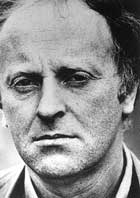|
|
|
Venice - Cimitero di S. Michele in Isola |
|
Photo Frantisek Zboray, 2004 |

|
Joseph Brodsky was born in 1940, in
Leningrad, and began writing poetry when he was eighteen. Anna Akhmatova
soon recognized in the young poet the most gifted lyric voice of his
generation. From March 1964 until November 1965, Brodsky lived in exile in
the Arkhangelsk region of northern Russia; he had been sentenced to five
years in exile at hard labor for "social parasitism," but did not serve
out his term.
Joseph Brodsky's speech at the Nobel Banquet, December 10, 1987 Your Majesties, Ladies and Gentlemen, He would be joking, of course: because the angle was wrong, because according to the law of optics, a human eye can travel only for something like twenty miles in open space. The space, however, wasn't open. Nonetheless, it pleases me to think, ladies and gentlemen, that we used to inhale the same air, eat the same fish, get soaked by the same - at times - radioactive rain, swim in the same sea, get bored by the same kind of conifers. Depending on the wind, the clouds I saw from my window were already seen by you, or vice-versa. It pleases me to think that we have had something in common before we ended up in this room. And as far as this room is concerned, I think it was empty just a couple of hours ago, and it will be empty again a couple of hours hence. Our presence in it, mine especially, is quite incidental from its walls' point of view. On the whole, from space's point of view, anyone's presence is incidental in it, unless one possesses a permanent - and usually inanimate - characteristic of landscape - of a moraine, say, of a hilltop, of a river bend. And it is the appearance of something or somebody unpredictable within a space well used to its contents that creates the sense of occasion. So being grateful to you for your decision to award me the Nobel Prize for literature, I am essentially grateful for your imparting to my work an aspect of permanence, of a glacier's debris, let's say, in the vast landscape of literature. I am fully aware of the danger hidden in this simile: coldness, uselessness, eventual or fast erosion. Yet if it contains a single vein of animated ore - as I, in my vanity, believe it does - then this simile is perhaps prudent. As long as I am on the subject of prudence, I should like to add that through recorded history, the audience for poetry seldom amounted to more than 1 % of the entire population. That's why poets of antiquity or of the Renaissance gravitated to courts, the seats of power; that's why nowadays they flock to universities, the seats of knowledge. Your academy seems to be a cross between the two; and if in the future - in that time free of ourselves - that 1 % ratio will be sustained, it will be, not to a small degree, due to your efforts. In case this strikes you as a dim vision of the future, I hope that the thought about the population explosion may lift your spirits somewhat. Even a quarter of that 1 % will make a lot of readers, even today. So my gratitude to you, ladies and gentlemen, is not entirely egoistical. I am grateful to you for those whom your decisions make and will make read poetry, today and tomorrow. I am not so sure that man will prevail, as the great man and my fellow American once said standing, I believe, in this very room; but I am quite positive that a man who reads poetry is harder to prevail upon than upon one who doesn't. Of course, it's one hell of a way to get from Petersburg to Stockholm; but then for a man of my occupation the notion of a straight line being the shortest distance between two points has lost its attraction long time ago. So it pleases me to find out that geography in its own turn is also capable of poetic justice. Thank you!
|